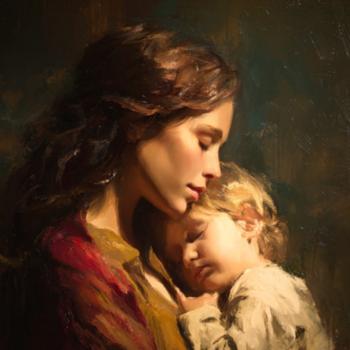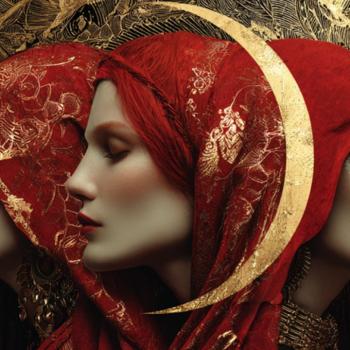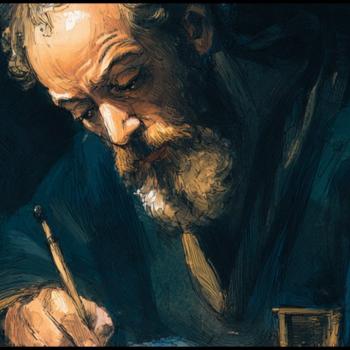
My previous blog post unleashed a surprising number of reactions from both strangers and friends who were either worried about my spiritual condition or excited about my newest declaration of heretical insight.
Funny enough, I actually appreciated both reactions.
Those who knew me in the real world messaged or texted or called me because they were genuinely confused, or concerned, about my post. They either wanted to see how I was doing, or they hoped to gain some clarity on where I was at and why.
Those who did not know me personally contacted me to let me know they were in the same boat and wanted to encourage me to keep seeking truth in my own way, without fearing to question, or ask, or doubt.
Both reactions were coming from a place of care and I appreciated all of them.
As I took the time to process my last post and clarify my thoughts for people over the last few days, I realized the fundamental struggle that has become the catalyst for my slide down this slippery slope: The Canon of Scripture.
Specifically, the idea of a New Testament Canon, which I have come to feel is nothing more than an attempt to manipulate and control people who simply want to know and connect with God through Christ.
I say this because it was created for purely political purposes and not from any Divine edict.
See, the Christian movement had been developing just fine for about 400 years without anyone even once suggesting the need for a single collection of approved writings.
Yet, soon after the Pagan Emperor Constantine “converted” to their faith, Church leaders suddenly decided that there must be one – and only one – set of approved New Testament writings that everyone must agree on, or suffer the deadly consequences.
If you study early Christian history, and especially the writings of those pre-Constantinian Church Fathers, you’ll see that each of them had their very own, personal list of what they considered to be “inspired writings.”
For example, some of them considered The Book of Enoch and The Didache to be inspired, along with the Four Gospels and a handful of Paul’s epistles. Others considered The Shepherd of Hermas and The Wisdom of Solomon to be scripture, along with Hebrews, James, Mark, Luke and John. Still, others added books we’ve never heard of to their list – like Judith or The Epistle of Barnabus – while excluding others that later became established as the official New Testament Canon a few hundred years later.
My main point is that there shouldn’t have ever even been any Canon of the New Testament created in the first place.
Why? Because the creation of this Canon wasn’t inspired by the Holy Spirit. It was inspired by a Pagan Emperor who wanted a tool he could use to control a growing religious movement that had become a threat to the Roman Empire.
No, Constantine did not command the Christians, specifically, to go and create a New Testament Canon in so many words. But, the influence he had over the Christian Church in his day is very clear and so it is no coincidence that, after nearly 400 years without any official Canon, we suddenly see [post-Constantine] a sudden shift in this direction.
So, when the earliest known complete list of the 27 books of the New Testament shows up in a letter written by Athanasius [367 AD], and the same official 27-book New Testament Canon formally established during the councils of Hippo (393) and Carthage (397) in North Africa, we are seeing the influence of a Pagan Emperor upon a Christian religion that, previously, had no interest in creating any official New Testament Canon.
Constantine’s agenda was nothing less than the redefinition of Christianity from a way of living – which included practicing radical enemy-love and creative non-violence along with a prohibition from joining the Roman Army – into a set of belief statements that made it easier to define who was and who was not a Christian.
It also made it much easier to eliminate those early Christian practices of non-violence, enemy-love, and all of those pervasive anti-Empire sentiments that had permeated the faith up to that point.
And the formulation of our existing New Testament Canon was quite arbitrary and strange. For example, do you know why there are only 4 Gospels in our Bible? We know that there were a few dozen other Gospels of Christ in circulation in those first few centuries, so why these 4 and no more?
Well, according to Irenaeus it’s because:
“It is not possible that the gospels can be either more or fewer in number than they are. For, since there are four zones of the world in which we live, and four principal winds, while the church is scattered throughout all the world, and the “pillar and ground” of the church is the gospel and the spirit of life; it is fitting that she should have four pillars, breathing out immortality on every side, and vivifying men afresh.” [As quoted from Against Heresies]
Now, if that sounds a bit silly to you, you’re not alone.
It seems more as if Irenaeus knew there were many other Gospels circulating and he preferred these specific ones, and so he arbitrarily appeals to whatever example he can point to that equals the number four to justify that preference.
By limiting the approved number of Gospels, we were prevented from enjoying the wisdom found in other writings such as The Gospel of Thomas, The Gospel of Truth, The Gospel of Mary, and The Gospel of Philip, among others.
The other problem with creating a New Testament Canon was that it attempted to silence the voice of the Holy Spirit for centuries. Not that it could, of course. But, for many, the Canon of Scripture took the place of the Holy Spirit’s voice which Jesus and the Apostles assured us [in the New Testament Scriptures] that everyone could hear, and discern, and comprehend directly – for themselves – without the need for any pastor, leader, teacher or spiritual guru present.
To this very day, we are still suffering the loss of faith in the direct, personal experience of Christ by the individual believer apart from the Bible.
As I have been reading through the Gospel of Thomas for a new weekly series I’m currently writing for my Patreon supporters, and also The Gospel of Truth [another lost text of early Christianity that was found, along with Thomas and other writings, at Nag Hammadi in 1945], I find myself growing genuinely angry about the loss of this wisdom and poetry.
It seriously troubles me that, for over a thousand years, Christians could not read these texts, and in fact would never even know they existed had it not been for that accidental discovery of codices over 77 years ago.
Obviously, the reasons why those so-called “Gnostic Gospels” were not included has more to do with the internal politics and theological conflicts of the earliest Christians than anything else. But, it’s hard not to dream about the Christianity we could have inherited had those books not been condemned and if Constantine had not succeeded in corrupting the faith.
So…all of that to say, the idea of a New Testament Canon is just offensive to me. There never should have been one created in the first place. The “God-breathed writings” are too numerous to contain in a single volume. The voice of the Spirit is too ubiquitous to be bound in a book.
You and I are living epistles of God’s ongoing conversation with all of Creation.
That’s why I can’t handle it when someone’s pat comeback to any discussion is, “Well, the Bible says…”, because the Bible we have shouldn’t exist and the limitation of God’s voice to what was said to a handful of people 2,000 years ago is simply not acceptable to me anymore.
Not anymore.
**
Keith Giles is the author of the 7-part best-selling “Jesus Un” book series from Quoir Publishing. His latest -and final book – in this series, Jesus Unarmed: How The Prince Of Peace Disarms Our Violence is available now. Keith is also the host of Second Cup with Keith [a new solo podcast available now on the Ethos Radio App, for Apple and Android and on Spotify; and the Heretic Happy Hour Podcast [along with co-hosts Matthew Distefano, Dr. Katy Valentine, and Derek Day], and the new Apostate’s Anonymous podcast with Matthew Distefano. He and his wife, Wendy, currently live in El Paso, TX and work with Peace Catalyst International.













